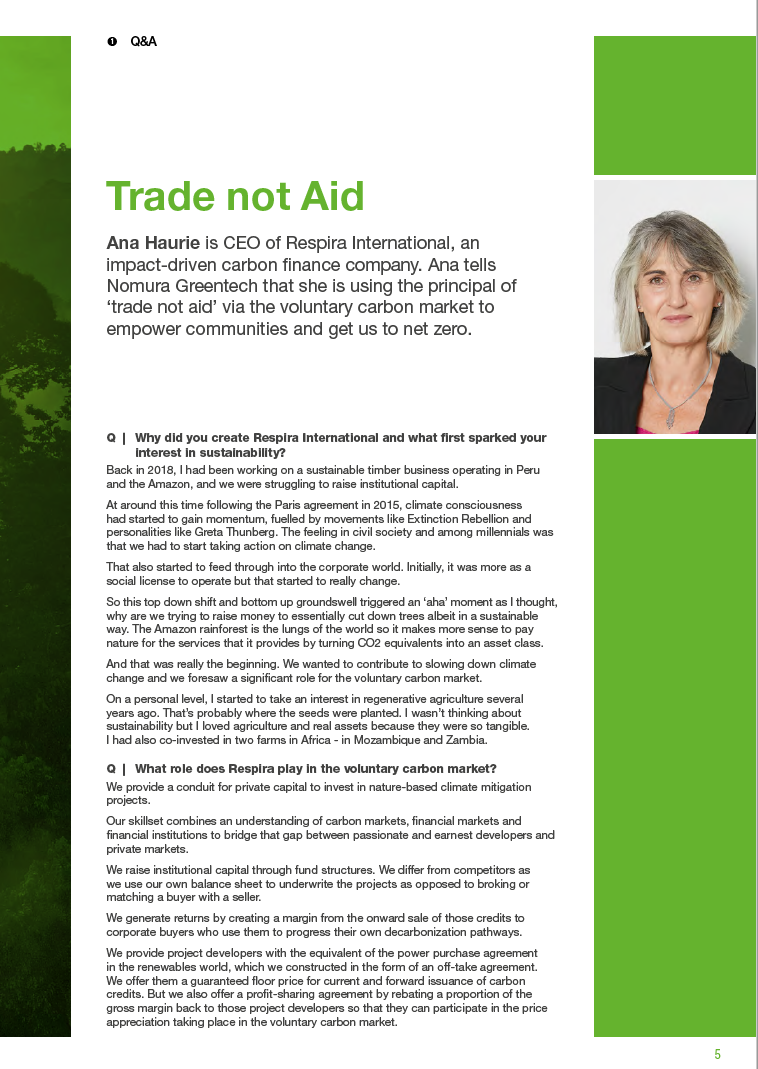-
Along the decarbonization pathway to net zero, companies can use carbon credits to mitigate emissions within their core operations
-
The voluntary carbon market has grown to $2 billion but it needs to be in the trillions of dollars so we see the potential to grow 50-fold
-
Nature is the only tool available at scale right now to remove carbon from the atmosphere. Nature-based solutions can account for one third of the mitigation that we need between now and 2030 in order to even be on a global net-zero track
Why did you create Respira International and what first sparked your interest in sustainability?
Back in 2018, I had been working on a sustainable timber business operating in Peru and the Amazon, and we were struggling to raise institutional capital.
At around this time following the Paris agreement in 2015, climate consciousness had started to gain momentum, fuelled by movements like Extinction Rebellion and personalities like Greta Thunberg. The feeling in civil society and among millennials was that we had to start taking action on climate change.
That also started to feed through into the corporate world. Initially, it was more as a social license to operate but that started to really change.
So this top down shift and bottom up groundswell triggered an ‘aha’ moment as I thought, why are we trying to raise money to essentially cut down trees albeit in a sustainable way. The Amazon rainforest is the lungs of the world so it makes more sense to pay nature for the services that it provides by turning CO2 equivalents into an asset class.
And that was really the beginning. We wanted to contribute to slowing down climate change and we foresaw a significant role for the voluntary carbon market.
What role does Respira play in the voluntary carbon market?
We provide a conduit for private capital to invest in nature-based climate mitigation projects.
Our skillset combines an understanding of carbon markets, financial markets and financial institutions to bridge that gap between passionate and earnest developers and private markets.
We raise institutional capital through fund structures. We differ from competitors as we use our own balance sheet to underwrite the projects as opposed to broking or matching a buyer with a seller.
We generate returns by creating a margin from the onward sale of those credits to corporate buyers who use them to progress their own decarbonization pathways.
We provide project developers with the equivalent of the power purchase agreement in the renewables world, which we constructed in the form of an off-take agreement. We offer them a guaranteed floor price for current and forward issuance of carbon credits. But we also offer a profit-sharing agreement by rebating a proportion of the gross margin back to those project developers so that they can participate in the price appreciation taking place in the voluntary carbon market.
That was a core part of our thesis. An important part of nature-based projects is to give back to communities. If you are enabling nature to be a revenue provider through the systems, water and people that depend on it, then you need to create those economic incentives to preserve it.
This is also about generating returns for our investors so it’s a win-win-win. We really need to focus a lot more on this kind of ‘trade not aid’ in terms of generating revenue for those taking genuine climate action.
How important is the voluntary carbon market in reaching net-zero emissions?
It’s only voluntary because it doesn’t fall within a compliance market. I think it’s becoming less voluntary and should instead be renamed the verified carbon market, reflecting the carbon credits sold within them.
It’s really important to note that this is private sector led. That’s where you’re really starting to get traction now. As a company, net zero means you have got to a point where you can no longer reduce your emissions any further and you need carbon credits to compensate for those residual
emissions. If you haven’t counterbalanced the unavoidable emissions that still remain as part of your operations you absolutely need the voluntary carbon market, and for corporates that may change over time as technology enables us to decarbonise completely.
Along the decarbonisation pathway to net zero, companies can use carbon credits to mitigate emissions within their core operations.
And I think that they also serve another really important function. Nature is the only tool available at scale right now to remove carbon from the atmosphere. Nature-based solutions can account for one third of the mitigation that we need between now and 2030 in order to even be on a global net-zero track.
Certainly, more corporates are talking about net-zero pathways and an increasing number of companies are using carbon credits. The market has grown from about $240 million a few year ago to $2 billion this year but it needs to be in the trillions of dollars so we see the potential to grow 50-fold.
That’s why we need to also deal with the perceptions and lack of trust in this market. Corporates may be deterred because of the greenwashing risk and in some instances they choose to do nothing. Other companies are taking the right actions but don’t want to publicize it for the same reasons. That’s led to a phenomenon known as ‘Green Hushing’ where you keep the good work quiet.
Some carbon credits relate more to avoidance projects like building a solar plant rather than sequestration that removes carbon. Should more be done to ensure high standards?
We’ve always worked on projects with carbon credits that are issued by reputable registries like Verra and Gold Standard, and those standards evolve over time to ensure best practice.
The issue around financial additionality (whether the project would have gone ahead without the carbon credit funding) for renewable energy projects is absolutely valid and that’s why projects in developed countries and even in many developing countries no longer qualify to generate carbon credits.
But there are still emerging countries and island states that do require the funding to put in place renewable energy projects. In rural areas that aren’t connected to the grid, that additional revenue from an alternative source can make the difference between a project proceeding or not. Arguably even more important than renewable energy carbon credits, high-quality forest-protection credits, or REDD+, are critical if we are to stop deforestation this decade.
What potential do you see in the blue carbon credit market, for example using mangroves and seagrass?
We are one of four buyers of the Delta Blue project in Pakistan’s Indus Delta, the largest mangrove carbon offset in the world. The project has taken several years to get off the ground as it involved extensive growing and planting. It highlights why private capital is critical to decarbonization.
Channelling private capital to the global south – that’s bearing the brunt of the effects of climate change - is essentially what the VCM for nature is doing.
The Indus Blue project manager said to us `I want trade not aid’ as it’s much more useful and sustainable.
We auctioned the Delta Blue carbon credits on Singapore’s Climate Impact X. A total of 250,000 tons of credits were available and it was oversubscribed with bids for over 300,000 tons at a price, $27.50, above market expectations, underscoring the demand for high quality credits.
Several companies are looking at carbon capture and storage programmes with scope to sell these credits. Is this the future of the carbon credit market?
Carbon capture and storage is going to be a really important part of the voluntary carbon markets.
We need them because they are permanent removals, particularly those which involve mineralization or permanent storage under the seabed.
We have signed a memorandum of understanding with Drax which is building plants in the US and creating bioenergy with carbon capture and storage credits. We are starting to see the potential for real scale in the storage of bio energy emissions generated from burning waste wood.
Disclaimer
This content has been prepared by Nomura solely for information purposes, and is not an offer to buy or sell or provide (as the case may be) or a solicitation of an offer to buy or sell or enter into any agreement with respect to any security, product, service (including but not limited to investment advisory services) or investment. The opinions expressed in the content do not constitute investment advice and independent advice should be sought where appropriate.The content contains general information only and does not take into account the individual objectives, financial situation or needs of a person. All information, opinions and estimates expressed in the content are current as of the date of publication, are subject to change without notice, and may become outdated over time. To the extent that any materials or investment services on or referred to in the content are construed to be regulated activities under the local laws of any jurisdiction and are made available to persons resident in such jurisdiction, they shall only be made available through appropriately licenced Nomura entities in that jurisdiction or otherwise through Nomura entities that are exempt from applicable licensing and regulatory requirements in that jurisdiction. For more information please go to https://www.nomuraholdings.com/policy/terms.html.





